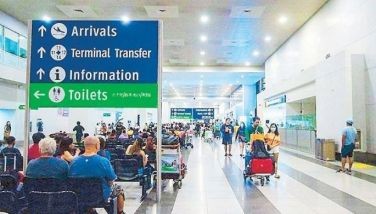Workers warn against perils of open skies
April 20, 2003 | 12:00am
Industries dependent on the aviation sector like tourism, transportation, recreation, entertainment and restaurant business also face the prospect of being dislocated should the country give in to foreign pressure to adopt open skies, labor groups warned.
The warning was raised during the recent Free Trade Alliance (FTA) forum in Ermita, Manila, which tackled the impact of an open skies policy on local aviation.
"The impact of a collapse of the aviation industry will be far-reaching and compound the country’s economic woes," Ed Oredina, chairman of the mobilization committee of the Philippine Airlines Employees Association, said.
Oredina said not only the airlines could go bankrupt but also ground handling and catering firms, cargo forwarders and brokers, tour operators and travel agencies.
"Although these are the sectors that will immediately suffer from the collapse of the aviation industry, there are other businesses dependent on it that will also experience financial difficulties should the government agree to the US-sponsored open skies policy," he said.
He identified these businesses as resorts, restaurants, recreational establishments, hotels and inns, duty free shops, entertainment centers, art and handicraft shops, transportation, exhibition and convention centers.
"These are small and medium-sized businesses, which will reel under a misguided and flawed air policy," Oredina said.
"These firms and shops directly and indirectly employ thousands of Filipinos. They create business for micro entrepreneurs and perk up local economies. They also generate revenues for the government," he pointed out.
Demosthenes Agan, president of the Miascor Workers Union, said the crisis being experienced by airlines worldwide brought about by the Sept. 11 terrorist attack on the US, and lately by SARS (Severe Acute Respiratory Syndrome), should caution the government from adopting air policies that would put the economy in peril.
"Kailangan pagaralan mabuti ng ating gobyerno ang kalagayan ng ating industriya bago magdesisyon tungkol sa open skies. (It is necessary for our government to study carefully the condition of our industry before making a decision on open skies)," Agan said.
He said local carriers are no match to foreign airlines, which have a huge fleet and extensive network worldwide.
Talks between Manila and Washington on the implementation of the RP-US Air Transport Agreement (ATA) that will pave the way for the adoption of open skies have reached a stalemate.
The warning was raised during the recent Free Trade Alliance (FTA) forum in Ermita, Manila, which tackled the impact of an open skies policy on local aviation.
"The impact of a collapse of the aviation industry will be far-reaching and compound the country’s economic woes," Ed Oredina, chairman of the mobilization committee of the Philippine Airlines Employees Association, said.
Oredina said not only the airlines could go bankrupt but also ground handling and catering firms, cargo forwarders and brokers, tour operators and travel agencies.
"Although these are the sectors that will immediately suffer from the collapse of the aviation industry, there are other businesses dependent on it that will also experience financial difficulties should the government agree to the US-sponsored open skies policy," he said.
He identified these businesses as resorts, restaurants, recreational establishments, hotels and inns, duty free shops, entertainment centers, art and handicraft shops, transportation, exhibition and convention centers.
"These are small and medium-sized businesses, which will reel under a misguided and flawed air policy," Oredina said.
"These firms and shops directly and indirectly employ thousands of Filipinos. They create business for micro entrepreneurs and perk up local economies. They also generate revenues for the government," he pointed out.
Demosthenes Agan, president of the Miascor Workers Union, said the crisis being experienced by airlines worldwide brought about by the Sept. 11 terrorist attack on the US, and lately by SARS (Severe Acute Respiratory Syndrome), should caution the government from adopting air policies that would put the economy in peril.
"Kailangan pagaralan mabuti ng ating gobyerno ang kalagayan ng ating industriya bago magdesisyon tungkol sa open skies. (It is necessary for our government to study carefully the condition of our industry before making a decision on open skies)," Agan said.
He said local carriers are no match to foreign airlines, which have a huge fleet and extensive network worldwide.
Talks between Manila and Washington on the implementation of the RP-US Air Transport Agreement (ATA) that will pave the way for the adoption of open skies have reached a stalemate.
BrandSpace Articles
<
>
- Latest
- Trending
Trending
Latest




























